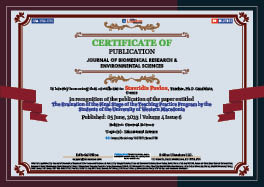Stavridis Pavlos*
Volume4-Issue6
Dates: Received: 2023-05-01 | Accepted: 2023-06-03 | Published: 2023-06-05
Pages: 953-961
Abstract
Teaching practice is an integral part of the teachers’ education program met in every Department of Primary Education. Through this, prospective teachers acquire a wide range of experiences from their contact with school, both by observing and by conducting lessons, while they focus on the practical as well as the theoretical aspect of their studies.
In the Department of Primary Education of Florina, teaching practice program is divided into three phases, initially in the form of observation (Phase I) and then with personal hourly teaching in the classroom (Phase II). Phase III is the conclusion of the teaching practice and aims at acquiring direct experience of the daily work and life at school, at developing prospective teachers’ ability to self-evaluate their work as well as at becoming aware of their pedagogical responsibility towards students through teaching a school class for about two weeks.
This paper presents students' views on the extent to which the main objectives of Phase III are met, on how significant it is in guiding and supporting their work and on the difficulties, they have encountered in conducting it. This research approach is part of an on-site long-term research which examines the overall teaching practice program, using all prospective teachers (126) throughout their studies as a control group, and questionnaire and semi-structured interview as research tools, providing us with both quantitative and qualitative data.
By analyzing the research data, we find that students: a) consider Phase III one of the most important parts of their practical training, b) acquire direct experience of everyday school life, c) develop the ability to reflect on and self-evaluate their work, d) design and prepare teaching under real working conditions, e) develop the ability to deal in a personalized way with children with particular teaching problems, while f) they encounter significant problems with the time-consuming process of preparing the next day's lesson plan.
FullText HTML
FullText PDF
DOI: 10.37871/jbres1756
Certificate of Publication

Copyright
© 2023 Pavlos S. Distributed under Creative Commons CC-BY 4.0
How to cite this article
Pavlos S. The Evaluation of the Final Stage of the Teaching Practice Program by the Students of the University of Western Macedonia. J Biomed Res Environ Sci. 2023 June 05; 4(6): 953-961. doi: 10.37871/jbres1756, Article ID: JBRES1756, Available at: https://www.jelsciences.com/articles/jbres1756.pdf
Subject area(s)
References
- Papadopoulou V, Argyropoulou S, Theodorou D. Critical Cases during students' teaching practice: Promoting prospective teachers’ reflection. Greek Pedagogical and Educational Research. Rethimno. 2010.
- Theodorou D, Teaching practice in the curricula of the primary education departments. Unpublished doctoral dissertation. Florina. 1998.
- Antoniou Ch. Teacher’s education. Athens: Ellinika Grammata. 2009.
- Zmas A, Papadopoulou B. The relation between theory and practice from a philosophical point of view and its implications for the education of prospective teachers. Education Sciences. 2007;4:229-242.
- Xoxellis P. School and teacher faces with current challenges. Macednon. 1997;4:3-19.
- Papadopoulou V., Teaching Practice of prospective teachers as a link between theory and practice: Possibilities, limits and perspectives. Proceedings of the 9th Panhellenic Conference of the Pedagogical Society of Greece Greek Pedagogical and Educational Research. University of Western Macedonia: Florina; 2014.
- Study guide of the pedagogical department of primary education Florina. 2013-1014.
- Cohen L, Manion L, Morrison K. Research methods in education. Routledge. 2008.
- Murray TR. Blending qualitative and quantitative research methods in theses and dissertations. Corwin. 2003.
- Robson C. Real world research. A tool for social scientists and professional researchers. Gutenberg. 2007.
- Oppenheim AN. Questionnaire design, interviewing and attitude measurement. Pinter. 1992.
- Wilson N, McLean S. Questionnaire design: A practical introduction. University of Ulster. 1994.
- Cohen L, Manion L, Morrison K. Educational research methodology. Metaixmio. 2012.
- Miles MB, Huberman AM, Saldana J. Qualitative data analysis: A Methods Sourcebook. 3rd ed. SAGE; 2014.
- Krippendorff K. Content analysis: An Introduction to its Methodology. 2013.
- Mehta CR, Patel NR. Exact Tests. SPSS. 1996.
- Celik O, Yorulmaz A, Cokcaliskan H. Pre-service primary school teachers’ beliefs about the consistency of the teacher training program on the formation of their teacher identity. International Online Journal of Education and Teaching. 2021;8(2):1279-1290.
- Gokhan B. Effect of student teachers’ teaching beliefs and attitudes towards teaching on motivation to teach: mediating role of self-efficacy. Journal of Education for Teaching. 2022;48(3):348-363. doi: 10.1080/02607476.2021.2006043.
- Hulme M, Wood J. The importance of starting well: the influence of early career support on job satisfaction and career intentions in teaching. Journal of Further and Higher Education. 2022;46(4):504-521. doi: 10.1080/0309877X.2021.1985981.
- Thoidis I, Papadopoulou V, Argyropoulou S. The graduates of the Pedagogical Department of Primary Education in Florina assess and evaluate the teaching practice program in the framework of the Curriculum. Proceedings of the Panhellenic Conference. Education and Training of the Teacher. Rethimno. 2009.